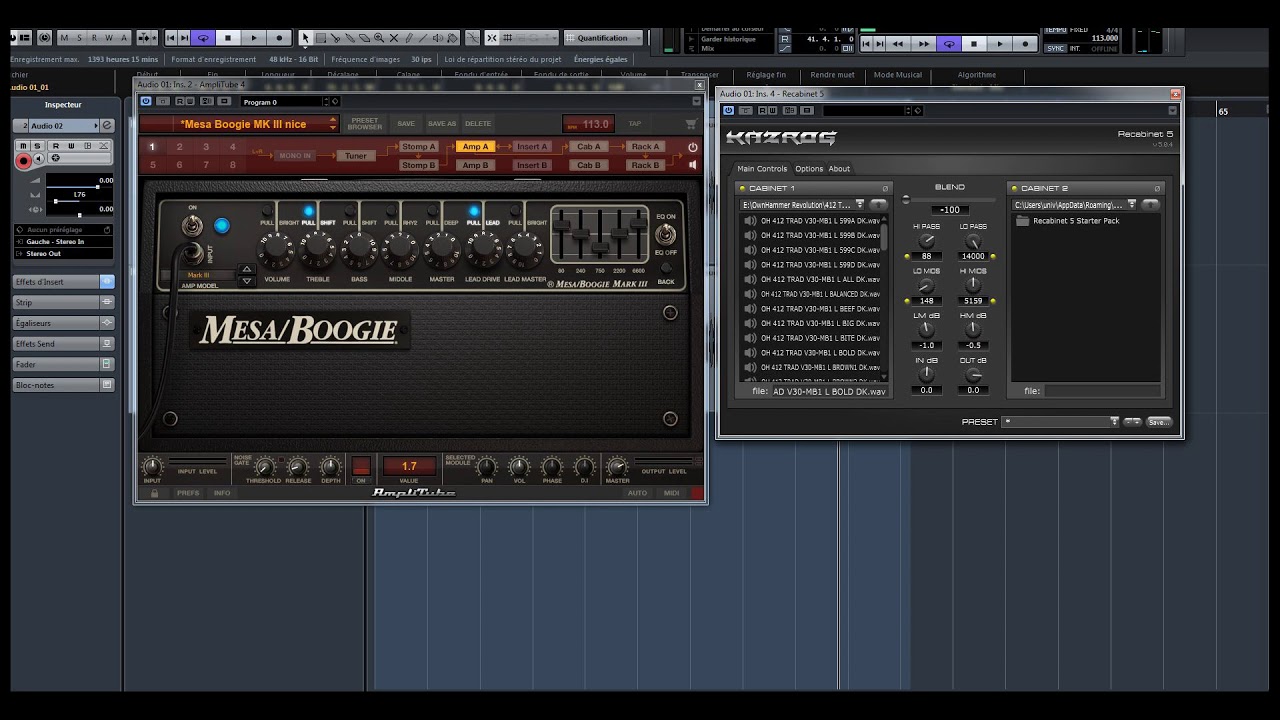Ownhammer – OH-412-TRAD-V30-MB1 (WAV)

High-quality guitar impulses with a sampling frequency of 44.1, 48, 88.2, and 96 kHz
THE CABINET
The “412 TRAD” is based on and seeking to recreate the sound of a MESA / Boogie® Rectifier® Traditional 4×12 closed back cabinet. THE SPEAKER
The “V30-MB1” is based on and seeking to recreate the sound of 12 inch, 8-ohm, 55 Hz cone Celestion® T4335 Vintage 30 speakers made in March of 1993.
THE MICS AND MIC MIXES
MICS
Auxiliary Placements
• “AUX” is a mixture of the FLOOR, MID, REAR, and ROOM captures.
• “FLOOR” is comprised of a floor-plane placed vintage Neumann® KM84 condenser microphone.
• “MID” is comprised of a mid field placed AEATM R92 ribbon microphone.
• “REAR” is comprised of a cabinet rear placed vintage Neumann® KM84 condenser microphone.
• “ROOM” is comprised of a room placed vintage Neumann® KM84 condenser microphone. Condenser Microphones
• “87” is based on a vintage Neumann® U87.
• “414” is based on an AKG® C414 B-ULS. Dynamic Microphones
• “57” is based on a modern production Shure® SM57.
• “421” is based on a vintage Telefunken® / Sennheiser® MD421-5. Ribbon Microphones
• “121” is based on a Royer® R121. • “160” is based on a Beyerdynamic® M160.
MIXES
• “599” – a mixture of the three most popular microphones for recording electric guitar cabinets
• “ALL” – a single position from each of the microphone category types mixed together
• “BALANCED” – a mix where no certain frequency range (s ) dominates the spectrum
• “BEEF” – a solid and meaty sound that is centered and tightly packed around the low mids
• “BIG” – contains a large and full bottom end, but without being overly dark
• “BITE” – lots of top end and teeth
• “BOLD” – forward midrange with a slightly relaxed top and bottom end
• “BROWN1” – a recreation of the infamous “brown sound”, as it was in the early years of the legendary tone
• “BROWN2” – a softer and more pleasing derivative of the “brown sound”, more reminiscent of later years
• “CHUNK” – a bulky and meaty tone that resonates in the lower midrange
• “CLASSIC” – a page from classic rock, for those about to rock
• “CUT” – very tight low end with a cutting upper midrange
• “DENSE” – a weighty sound that still remains balanced throughout
• “EARTH” – exudes a solid, mellow, warm, earthy tonality
• “EVEN” – a mix that results in a very flat frequency response, within the context of the given cab / speaker
• “FAT” – fat with thick lows and low mids, but still retaining clarity and definition
• “FIRE” – burning upper mids with seared edges
• “FORWARD” – an up-front sound, utilizing a specific technique that has been used on numerous platinum albums
• “FULL” – retains a very full body without killing the top end, very popular over many years for live use
• “GRIT” – provides excellent clarity and an aggressive, edgy mid range
• “HAIR” – offers a sound with a substantial amount of hair on the top end
• “HARD” – similar to Forward, but with a harder and more stiff edge to the tonality
• “IRON” – a strong, ‘in your face’ and transformer saturated sound that is both clear and dense
• “LEAN” – tight and light on the bottom end, and neatly organized in the mids through the highs
• “MODERN” – even but still modern sounding and somewhat aggressive
• “OLDE” – very reminiscent of the origins of electric recordings: soft, subdued, rich, and full
• “PARADOX” – a balanced tone built around the contrasting coupling of very dark and very bright components
• “POCKET” – right in the pocket for guitar as accompaniment, healthy and even but slightly reserved
• “RIP” – healthy upper end clarity with a dose of fatness
• “SCOOP” – elevates the top and bottom end, resulting in a slight mid scoop and forward sound
• “SCREAM” – rude, aggressive, and a sound that is absolutely refusing to not be heard
• “SMOKE” – slightly dark and hazy sound, with a more transparent rather than spongy midrange
• “THICK” – very robust, particularly in the lower midrange, while still retaining some upper-mid life
• “VINTAGE” – smooth top end with a soft, syrupy midrange with a round bottom end
• “WARM” – warm and full in the low mids and midrange For mixes that have “1”, “2”, etc. or “A”, “B”, etc. iterations noted at the end of the file name, unless otherwise noted or described above mix “1” / ”A” will be brighter with less bottom end, and mix “2” / ”B” will be darker with more lows, and so on and so forth.
Wave audio format IR’s (.wav) are compatible with convolution reverb type loaders in recording software and outboard hardware units and are provided in:
• 24 bit resolution
• 44.1, 48, 88.2, and 96 kHz sample rates
• minimum phase transformed
• 208 millisecond Mono
• 500 millisecond TrueStereo ™
KNOW YOUR PLATFORM’S FILE FORMAT!
THIS LIBRARY CONTAINS .WAV FORMAT FILES ONLY.